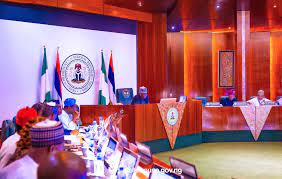This week marked a significant turn in the country’s political landscape as President Bola Ahmed Ahmed Tinubu made a bold move, suspending Dr Betta Edu, the Minister of Humanitarian Affairs and Poverty Alleviation from office over allegation of corruption.
This action reflects the President’s commitment to uphold the highest standards of integrity, transparency and accountability in the administration of the country’s resources.
The Special Adviser to the President on Media and Publicity Chief Ajuri Ngelale said that the suspended minister was directed to hand over to the Permanent Secretary of the Federal Ministry of Humanitarian Affairs and Poverty Alleviation.
The President also directed the chairman of the Economic and Financial Crimes Commission (EFCC) to conduct a thorough investigation into all aspects of the financial transactions involving the Federal Ministry of Humanitarian Affairs and Poverty Alleviation and its agencies.
The suspended minister was directed by the President to fully cooperate with the investigating authorities as they conduct their investigation.
The President has tasked a panel headed by the Coordinating Minister of the Economy and Minister of Finance to, among other functions, conduct a comprehensive diagnostic of the financial architecture and framework of the social investment programmes to conclusively reform the relevant institutions and programmes in a determined bid to eliminate all institutional frailties for the exclusive benefit of disadvantaged households and win back lost public confidence in the initiative.
Yet, while the suspended minister may appear to have sinned against the Nigerian state and its people, the truth is that the real issue goes beyond Beta Edu. The transparency and accountability measures that are presently in place in the country have not brought the desired effect on governance and development.
The gaps in legislation, capacity, values and resourcing have frustrated transparency and accountability in the country and bridging these gaps, as the Tinubu-led administration seeks to do, would strengthen the various anti-corruption measures and, in turn, deepen good governance.
A good look at the transparency and accountability measures, therefore, is desirable to ensure that the zeal for transparency and accountability is sustained and that the prevailing measures are fit for purpose and further strengthened and institutionalised.
Whether now or in the future, Nigeria needs more transparency and accountability, not less. Nigeria cannot have good governance when the principles of transparency and accountability are lacking.
The principles of accountability, transparency, and participation have over the years become nearly universal guiding features of democracy, policy making and good governance. More particularly, transparency and accountability constitute the panacea for sustainable democracy in forward-looking nations of the world.
When people talk about governance, they lay considerable emphasis on transparency and accountability, and clearly, there is no gainsaying that these are not attainable unless citizens participate in governance processes and demand them.
Accountability constitutes a foundational principle of sound governance within any democratic society. It guarantees that those vested with power shoulder responsibility for their choices, actions and the consequences of their policies.
In Nigeria, a nation characterised by an intricate political landscape and a history of governance complexities, the matter of holding leaders accountable remains a pressing concern.
Presently, there is an observable decline in the genuine commitment to governance responsibilities and, thus, this administration should be commended for trying to ignite the old passion for good governance.
However, much as this administration deserves our commendation regarding the issue of accountability in the humanitarian ministry, the administration should go beyond the suspension of the former minister of Humanitarian Affairs and Poverty Alleviation to completely overhaul the country’s social protection architecture.
This the President can do through digitising the cash transfer programmes and strengthening accountability mechanisms in all social protection programmes being implemented by the federal government and its agencies.
Similarly, international development partners and the private sector should commit to strengthening social protection institutions in Nigeria by focusing on supporting state institutions with social protection mandates to deliver to the most vulnerable in the country.
Essentially, this administration will do well to establish a corrupt-free social safety programme to provide a basic income or assistance to those in extreme poverty, promote gender equality and empower women to participate fully in the economy and society.
The government should also expand access to financial services and promote savings and microcredit initiatives to help people start small businesses, implement measures to reduce corruption, which can divert resources away from poverty-alleviation programmes and encourage community-led development projects and initiatives to address specific local challenges.
While the suspension of the minister is a significant step, it represents just a part of a broader, more systemic reform needed in Nigeria. By embracing comprehensive measures to promote transparency and accountability, Nigeria can make strides towards effective governance and sustainable development.
